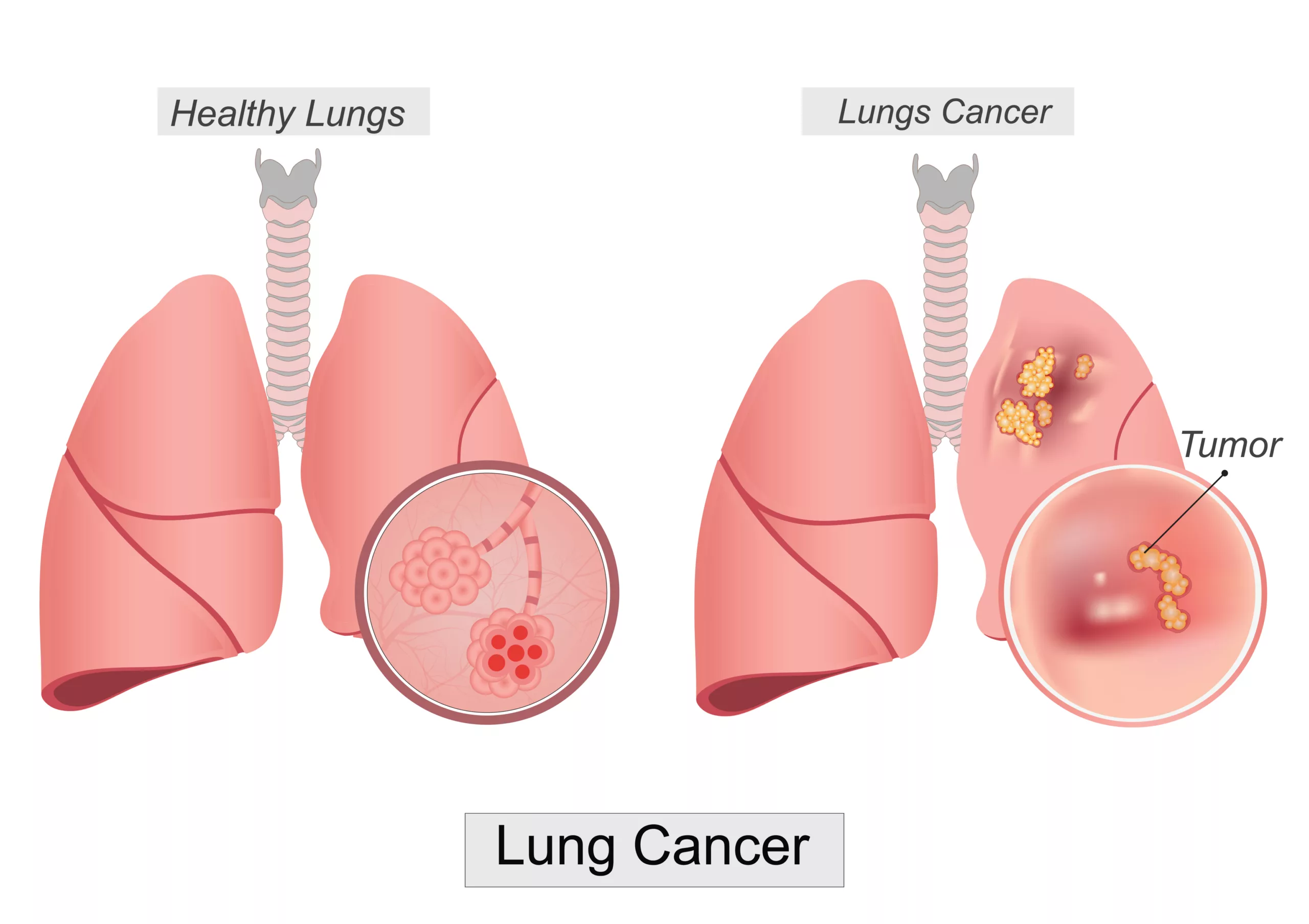Lung Cancer
The lungs are vital organs responsible for breathing and are part of the respiratory system. The lungs are cone shaped breathing organs, that bring oxygen into the body as you breathe in, then release carbon dioxide as you breathe out. Lung cancer is one of the leading causes of cancer deaths worldwide. Lung cancer starts when abnormal cells in the lungs grow uncontrollably, forming a tumor. If untreated, the cancer can spread to other parts of the body.
Symptoms
Lung cancer may not cause symptoms at first, but common signs and symptoms include:
- A persistent cough that doesn’t go away
- Chest pain
- Coughing up blood
- Shortness of breath
- Hoarseness
- Unexplained weight loss
- Loss of appetite
- Fatigue
- Infections such as bronchitis and pneumonia that don’t go away or keep coming back
- New onset of wheezing

When to See a Doctor
If you experience a persistent cough, chest pain, shortness of breath, or other unexplained changes in your breathing or health, it’s important to schedule an appointment with your doctor. Early evaluation can lead to better outcomes.
Causes and Risk Factors
Prevention
- Don’t start smoking: If you’ve never smoked, don’t start. Talk to your children early about the risks.
- Quit smoking: Quitting lowers your risk of lung cancer, even if you’ve smoked for years. Help is available.
- Avoid secondhand smoke: Stay away from areas where people smoke and ask others not to smoke around you.
- Test your home for radon: High radon levels can increase your risk. Testing and mitigation are simple and effective.
- Limit exposure to workplace carcinogens: Follow safety guidelines and wear protective gear if you work around toxic substances.
- Eat a healthy diet: Choose a variety of fruits and vegetables. Skip high-dose supplements unless recommended.
- Exercise regularly: Aim for consistent physical activity most days of the week to support lung health.
Diagnosing Lung Cancer
If your doctor suspects lung cancer, they may order a series of tests to confirm the diagnosis, identify the cancer type, and guide treatment. These tests help rule out other conditions and determine how advanced the cancer may be.
Imaging Tests
Chest X-rays and CT scans help identify abnormal areas in the lungs, such as nodules or masses that may not cause symptoms.
Sputum Cytology
If you have a productive cough, your doctor may examine a sample of mucus (sputum) under a microscope to look for cancer cells.
Bronchoscopy
A thin, lighted tube is passed through your throat into the lungs to view abnormal areas and collect tissue samples for testing.
Mediastinoscopy
A small incision is made at the base of your neck to collect tissue from the lymph nodes near your lungs, helping check for spread.
Needle Biopsy
Guided by X-ray or CT scan, a thin needle is inserted through your chest wall to collect a sample from a suspicious area in the lung.
Biopsy of Other Areas
If cancer has spread, your doctor may collect tissue from affected organs like the liver or lymph nodes for further analysis.
Lab Analysis of Cancer Cells
Collected samples are studied in a lab to determine the type of lung cancer and specific markers that help guide treatment options.
Lung Cancer Stages

Treatment
Each lung cancer treatment plan is tailored to the individual, based on the cancer’s type, stage, location, and overall health. We understand that navigating treatment options can feel overwhelming, which is why our team is here to offer clear guidance, compassionate care, and support at every step.
In some cases, a patient may choose not to pursue active treatment if the side effects outweigh the potential benefits. In those situations, comfort-focused care can help manage symptoms like pain or shortness of breath and support quality of life.
Care plans may include*:
Surgery
- Wedge resection: removes a small, wedge-shaped portion of lung containing the tumor and surrounding healthy tissue
- Segmental resection: removes a larger section of lung, but not an entire lobe
- Lobectomy: removes one entire lobe of the lung
- Pneumonectomy: removes an entire lung
Therapies
- Radiation therapy
- Chemotherapy
- Targeted therapy
- Immunotherapy
Supportive / Palliative care
*This is not a comprehensive list, and availability may vary by provider.
Types of Lung Cancer
Doctors divide lung cancer into two major types based on the appearance of lung cancer cells under the microscope. Your doctor makes treatment decisions based on which major type of lung cancer you have. The two general types of lung cancer include:
Small Cell Lung Cancer (SCLC)
This fast-growing type of lung cancer is less common and occurs almost exclusively in people with a history of heavy smoking.
Non-small Cell Lung Cancer (NSCLC)
The most common type of lung cancer, NSCLC includes several subtypes such as squamous cell carcinoma, adenocarcinoma, and large cell carcinoma.
From Diagnosis Through Survivorship
At Lowcountry Oncology Associates, we’re committed to providing expert, compassionate care for individuals facing lung cancer. Our team works collaboratively to deliver personalized, high-quality treatment with timely access to the specialists and services that matter most. We are here to support you every step of the way, from diagnosis through survivorship.

